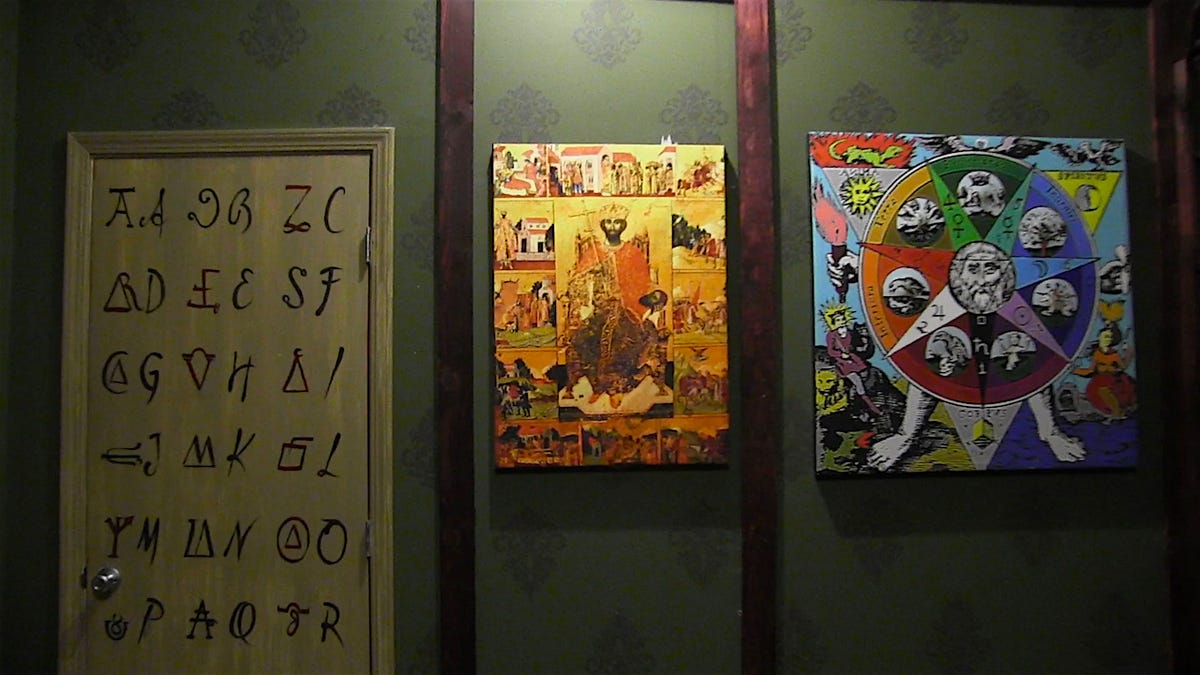We unlocked an escape room's hidden secrets
What happens when you mix a Myst, Mouse Trap and a Rubik's Cube? An escape room!

A brilliant madman locked me and two of my friends in a room recently, and the three of us worked together to get out before meeting our certain doom.
Okay, so that's a melodramatic way of putting it. But it's not entirely inaccurate.
For a long time, I've loved games like Myst: Games where you would find yourself in a strange place and need to work your way out by completing elaborate puzzles designed to frustrate and delight. Jonathan Blow's recent The Witness and Ron Gilbert's upcoming Thimbleweed Park are breathing new life into the genre. I was obsessed with puzzle games when I was little, playing masterpieces like The 7th Guest and The 11th Hour, all the way down to (warning: deep cut incoming!) Freddy Pharkas: Frontier Pharmacist.
You were probably into those games, too, which is why real-life versions of puzzle adventure games have been hot for a while now. If you're not familiar with them, they're called "escape rooms." Here's the basics of how they work:
- You get locked in a room with other people (either friends who came with, or strangers who book the same time slot)
- A story usually explains the goal and how much time you have to escape
- You team up with the rest of the group to solve puzzles and get out before time's up
It's a straightforward concept, but a mountain of clues, riddles and puzzles stand in your way, and you'll need all those neurons firing in your brain if you want to make it out in time. I've done a few escape rooms over the past couple of years, and most of them have been incredibly fun.
But who creates escape rooms? And how do they put it all together to make an experience that triggers both our nostalgia and our love of puzzle-solving? My friends and I went to Escape Room LA in Los Angeles, where I asked escape room creator John Hennessey to explain how he designs his interactive works of art.
Just like us, John played those same games for hours and hours, becoming inadvertently inspired by their content and the small but mighty thrill of accomplishment you get when you solve one puzzle and discover the next. It's almost shocking escape rooms didn't exist before this past decade; the first official escape room, Real Escape Game, was developed in Japan back in 2007 by SCRAP, and the idea blossomed from there. Some escape rooms pull in over $500,000 a year, making them a lucrative (but not necessarily booming) business for entrepreneurs looking to branch out into more creative ventures.
But to make a truly great escape room, you'll have to have more than a couple of puzzles in mind. Hennessey asserts his escape rooms go beyond the basics, and from my time in The Alchemist it's true: The puzzles offer a good challenge, but it's the small details that truly immerse players and make a memorable experience. One of the bigger puzzles involved our sense of smell, which is exactly the kind of out-of-the-box thinking escape rooms need to stand out as the industry expands. And Hennessey works with an actual set designer to make sure each room's ambience is perfect.
There are all kinds of escape room themes out there, ranging from horror to sci-fi, to 1940's detective noir, and most of them employ some level of clever technology alongside the standard locks you'll be opening up. But as the industry has expanded, customer expectations have also increased. Game masters need to come up with more complex puzzles and effects, creating bigger, badder rooms for visitors.
Just like those old games I mentioned earlier, completing a good escape room leaves an impression that's hard to forget. But you'll also run the risk of becoming obsessed with finding tougher, more elaborate challenges (again like those treasured titles we all played long ago).
So go forth and escape, if you can...but once you try it out, you might find yourself looking for stranger and more difficult places to be locked up.

